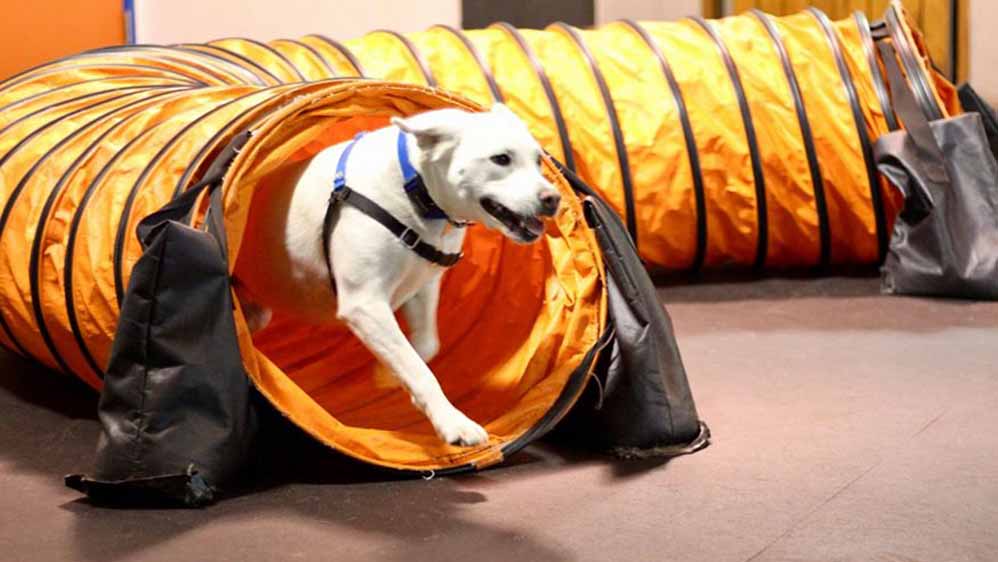Professional Insights on Dog Training Charlotte NC: Change Your Pup Today
Professional Insights on Dog Training Charlotte NC: Change Your Pup Today
Blog Article
Unlock Your Canine's Possible: Proven Dog Training Approaches for Success
Effective dog training is a nuanced process that hinges on understanding canine behavior and using clinically backed strategies. By integrating positive support, establishing clear commands, and focusing on socializing, dog proprietors can cultivate a productive connection with their family pets.
Comprehending Dog Behavior
Understanding pet dog habits is vital for effective training and cultivating a positive connection in between dogs and their proprietors. A comprehensive grasp of canine body language, articulations, and social communications is essential for acknowledging their demands and emotions. Pet dogs connect primarily with non-verbal signs; as an example, a wagging tail may show enjoyment, while pinned ears can signal fear or entry.

Additionally, environmental factors play a considerable function in shaping a pet's habits. Adjustments in routine, new surroundings, or the existence of unfamiliar people can cause stress or stress and anxiety in pets. Acknowledging these triggers enables owners to alleviate unfavorable responses and develop proper training approaches.
Eventually, a deep understanding of canine behavior lays the structure for successful training methods, boosting both habits and the overall bond in between the dog and its owner. Dog training. This knowledge is essential for fostering a well-adjusted, delighted canine buddy
Positive Reinforcement Strategies
Effective training relies heavily on favorable support strategies, which have actually been revealed to generate significant cause forming wanted behaviors in pet dogs. This technique entails compensating a canine for exhibiting certain habits, therefore boosting the chance that these behaviors will certainly be duplicated. Rewards can take different kinds, including treats, appreciation, playthings, or playtime, depending upon what encourages the specific pet dog.

It is vital to gradually phase out benefits as the canine finds out the behavior, transitioning to periodic reinforcement. This approach preserves the behavior gradually while preventing dependency on continuous incentives. By concentrating on favorable support, trainers can cultivate a relying on relationship with their pet dogs, promoting a participating and healthy and balanced training setting that enhances total obedience and performance.
Establishing Consistent Commands
A basic aspect of successful dog training is the facility of regular commands. Consistency in commands is vital for effective communication in between the instructor and the dog. When commands are consistent, pet dogs discover to link specific words with desired behaviors, which speeds up the training procedure and enhances understanding.
To establish consistent commands, it is important that all member of the family use the same terms and gestures. If one person utilizes "rest" while one more claims "rest down," it can create confusion for the pet dog. Select clear, distinct words for commands and make certain check this every person associated with the dog's training abides by these selections.
Enhance commands with constant practice, ensuring that the dog obtains sufficient possibilities to react properly. When a canine efficiently follows a command, immediate positive support needs to adhere to.
Last but not least, hold your horses. Establishing constant commands takes some time and effort. With devotion and clarity, you will help your dog develop a solid understanding of assumptions, inevitably leading to a mannerly companion.
Socialization and Exposure
Socializing a dog is essential for fostering a certain and well-adjusted buddy. This procedure entails subjecting your pet to a selection of atmospheres, individuals, and other animals to establish their social skills and adaptability. Early socialization, preferably in between the ages of three to fourteen weeks, is important, as it lays the groundwork for a pet dog's future actions.
During socializing, goal to provide favorable experiences in different setups, such as parks, hectic roads, and homes with various other animals. Introduce your pet dog to different stimulations, including sounds, views, and smells, making sure that each encounter is gratifying. This exposure helps reduce worry and stress and anxiety, leading the method for an extra durable pet.
Taking part in regulated group play sessions with various other dogs can also boost social skills, instructing your pet dog suitable communications and boundaries. Always monitor your pet dog's convenience degree during these experiences, progressively boosting exposure as their self-confidence expands. Keep in mind, the goal is to develop an all-round family pet that grows in diverse scenarios, promoting an unified connection with both people and other pets. Prioritizing socialization will significantly add to your dog's general happiness click this link and behavior throughout their life.
Overcoming Common Training Difficulties

An additional regular issue is disturbance. Pets may battle to concentrate in unfamiliar or active setups. Progressively desensitize your pet to interruptions by beginning training in a silent environment and gradually introducing more stimulations as they come to be skillful (dog training charlotte). Favorable reinforcement strategies, such as deals with and praise, can preserve inspiration and emphasis.
In addition, behavior issues like leaping or extreme barking can end up being irritating. Address these by educating alternate actions, such as resting smoothly when welcoming visitors. Uniformity and patience are essential; enhance preferred habits constantly and avoid abuse, which can bring about confusion.
Last but not least, acknowledge that each dog is distinct, and training timelines may differ. Tailor your technique to your pet's individual demands, and seek expert assistance if needed. With willpower and the ideal methods, conquering these difficulties can bring about a well-trained, pleased canine friend.
Verdict
In verdict, opening a dog's possible demands an extensive technique that includes an understanding of canine habits, the application of favorable reinforcement methods, and the establishment of regular commands. Early socialization and direct exposure to varied atmospheres additionally boost a canine's flexibility and confidence. By attending to typical training challenges with tailored strategies and persistence, a cooperative and harmonious partnership in between dog and trainer can be fostered, inevitably causing a mannerly friend qualified of flourishing in various scenarios.
Effective canine training is a nuanced procedure that hinges on comprehending canine actions and using clinically backed techniques.Understanding pet dog habits is necessary for efficient training and fostering a positive partnership between dogs and their proprietors.Effective training counts heavily on positive support methods, which have been shown to yield substantial results in forming wanted actions in canines. When commands are consistent, dogs learn to link stop dog from barking at people details words with wanted actions, which speeds up the training procedure and improves understanding.
In verdict, unlocking a dog's potential necessitates a detailed approach that incorporates an understanding of canine actions, the application of positive support strategies, and the facility of regular commands.
Report this page